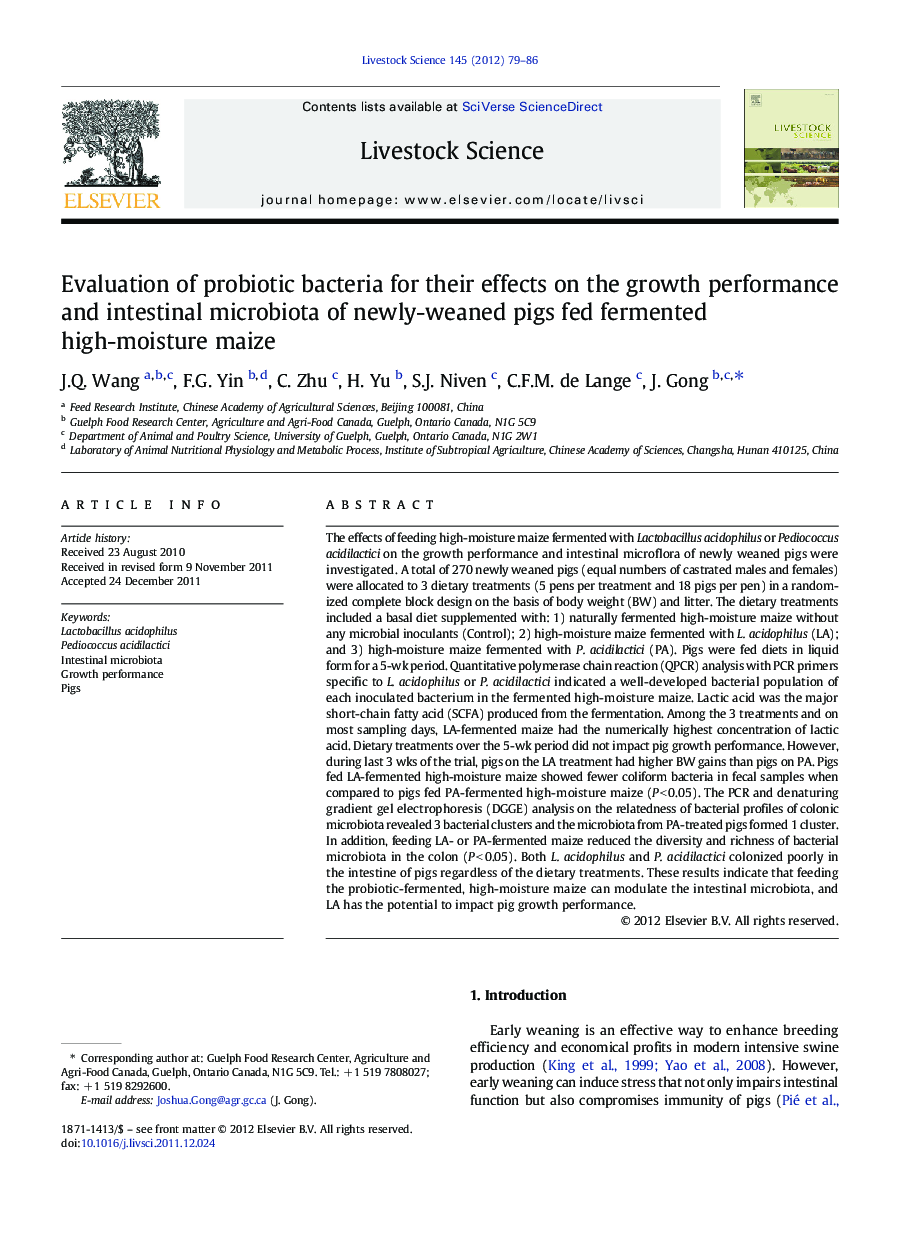| کد مقاله | کد نشریه | سال انتشار | مقاله انگلیسی | نسخه تمام متن |
|---|---|---|---|---|
| 5790564 | 1553987 | 2012 | 8 صفحه PDF | دانلود رایگان |
عنوان انگلیسی مقاله ISI
Evaluation of probiotic bacteria for their effects on the growth performance and intestinal microbiota of newly-weaned pigs fed fermented high-moisture maize
دانلود مقاله + سفارش ترجمه
دانلود مقاله ISI انگلیسی
رایگان برای ایرانیان
کلمات کلیدی
موضوعات مرتبط
علوم زیستی و بیوفناوری
علوم کشاورزی و بیولوژیک
علوم دامی و جانورشناسی
پیش نمایش صفحه اول مقاله

چکیده انگلیسی
The effects of feeding high-moisture maize fermented with Lactobacillus acidophilus or Pediococcus acidilactici on the growth performance and intestinal microflora of newly weaned pigs were investigated. A total of 270 newly weaned pigs (equal numbers of castrated males and females) were allocated to 3 dietary treatments (5 pens per treatment and 18 pigs per pen) in a randomized complete block design on the basis of body weight (BW) and litter. The dietary treatments included a basal diet supplemented with: 1) naturally fermented high-moisture maize without any microbial inoculants (Control); 2) high-moisture maize fermented with L. acidophilus (LA); and 3) high-moisture maize fermented with P. acidilactici (PA). Pigs were fed diets in liquid form for a 5-wk period. Quantitative polymerase chain reaction (QPCR) analysis with PCR primers specific to L. acidophilus or P. acidilactici indicated a well-developed bacterial population of each inoculated bacterium in the fermented high-moisture maize. Lactic acid was the major short-chain fatty acid (SCFA) produced from the fermentation. Among the 3 treatments and on most sampling days, LA-fermented maize had the numerically highest concentration of lactic acid. Dietary treatments over the 5-wk period did not impact pig growth performance. However, during last 3Â wks of the trial, pigs on the LA treatment had higher BW gains than pigs on PA. Pigs fed LA-fermented high-moisture maize showed fewer coliform bacteria in fecal samples when compared to pigs fed PA-fermented high-moisture maize (PÂ <Â 0.05). The PCR and denaturing gradient gel electrophoresis (DGGE) analysis on the relatedness of bacterial profiles of colonic microbiota revealed 3 bacterial clusters and the microbiota from PA-treated pigs formed 1 cluster. In addition, feeding LA- or PA-fermented maize reduced the diversity and richness of bacterial microbiota in the colon (PÂ <Â 0.05). Both L. acidophilus and P. acidilactici colonized poorly in the intestine of pigs regardless of the dietary treatments. These results indicate that feeding the probiotic-fermented, high-moisture maize can modulate the intestinal microbiota, and LA has the potential to impact pig growth performance.
ناشر
Database: Elsevier - ScienceDirect (ساینس دایرکت)
Journal: Livestock Science - Volume 145, Issues 1â3, May 2012, Pages 79-86
Journal: Livestock Science - Volume 145, Issues 1â3, May 2012, Pages 79-86
نویسندگان
J.Q. Wang, F.G. Yin, C. Zhu, H. Yu, S.J. Niven, C.F.M. de Lange, J. Gong,